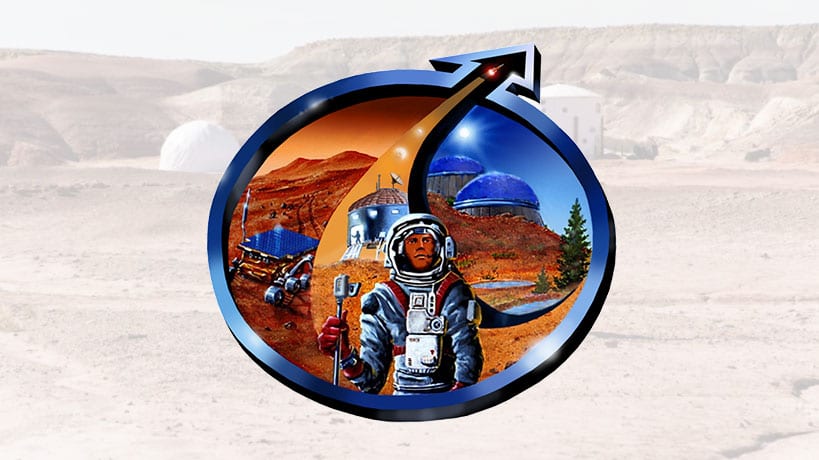
 At its international convention in Washington, D.C. on September 24th, the Mars Society announced that it will conduct an annual high school Mars rover competition. The contest, to be known as the American Mars Exploration Rover Challenge (AMERC), builds on the organization’s highly successful Mars rover competitions for university teams, including the University Rover Challenge (URC), held in Utah at the Mars Desert Research Station, and the European Rover Challenge (ERC), conducted on simulated desert terrain (“Mars yard”) at a science museum in Poland.
At its international convention in Washington, D.C. on September 24th, the Mars Society announced that it will conduct an annual high school Mars rover competition. The contest, to be known as the American Mars Exploration Rover Challenge (AMERC), builds on the organization’s highly successful Mars rover competitions for university teams, including the University Rover Challenge (URC), held in Utah at the Mars Desert Research Station, and the European Rover Challenge (ERC), conducted on simulated desert terrain (“Mars yard”) at a science museum in Poland.
The first AMERC competition will take place at a Mars yard built at The Wings over the Rockies Air & Space Museum in Denver, Colorado on the weekend of May 13-14, 2017. It will be open to high school teams from anywhere in the world.
The student contest will consist of four challenges for the rovers, including:
+ A terrain trek, commencing on easy terrain which will become more difficult, with rovers being awarded points for the number of milestones reached.
+ A task to deliver a small tool to a dummy representing a stranded, injured astronaut. Points will be awarded based on how close the tool is delivered to the manikin.
+ A task to operate an apparatus, for example, turn on a switch or push a button, with points awarded based on the number of switches thrown, buttons pushed and valves turned.
+ A task to find fossils placed in the terrain, with points for each fossil photographed and for each fossil gathered.
To accomplish the tasks, student teams will have to build rovers that can be controlled and operated from a remote station via Wi-Fi, using cameras on the rover to provide eyes for the operator, who will not be able to see the rover directly. Rovers will have a maximum mass of 15 kg (33 lbs.). Teams will need to raise their own funds or find parts to build their rovers, with a maximum parts budget for each team being $5,000.
Teams are free to design their rover any way they like within these limits, with, for example, wheels, treads, halftracks or legs all being acceptable means of propulsion. Airborne devices are not permitted, however, rovers may employ masts to hold cameras in elevated positions. Rovers will have 20 minutes to complete each task. To accomplish the required tasks, vehicles will need a propulsion system, a mechanical claw, a holding basket and an imaging and communication system. The computer employed as the remote control station will not count as part of the mass or cost of the rover. Photos of larger (50 kg) rovers used in the URC and ERC may be seen on the website of those competitions. Teams are free to base their design upon such models or use completely original designs. Teams may also employ rover kits or build their systems from scratch.
Student teams intending to compete should send a letter of intent containing the name of the team, the school and email and postal contact information to the Mars Society no later than November 30, 2016, along with a registration fee of $25. They will then be required to submit a design report describing their rover by January 31, 2017. The design report will be the basis for a down-select to approximately 20 finalist teams which will be invited to Denver to compete. Selection of the finalists will be announced by February 28th. Teams will then gather at Wings over the Rockies on Friday, May 12th for a briefing and preliminary social, with the actual competition beginning on the morning of Saturday, May 13th. The competition will continue through the afternoon of Sunday, May 14th, at which point the winners will be announced.
The first place winning team will receive a trophy and a prize of $3,000. Trophies and prizes of $1,500, $1000, $500, and $250 (respectively) will be awarded for the second, third, fourth and fifth place winners.
Further information, including answers to frequently asked questions and detailed contest rules, will be posted on the Mars Society website (www.marssociety.org) in the near future. All questions should be directed via email to: amerc@marssociety.org. Letters of intent to compete and registration fees may be sent to: The Mars Society, 11111 W. 8th Ave., Unit A, Lakewood, CO, 80215.
When announcing the new contest last month, Mars Society President Dr. Robert Zubrin said, “This competition will encourage hundreds and eventually thousands of young people to develop their technical talents and inspire millions more with the vision that those who learn their science can become the explorers of new worlds. Watching it unfold, the adult world should get the message that the best way to improve education is inspiration, and if the nation were to take on the challenge of Mars, the spirit of youth would rise to the occasion.”
May the best rover win!